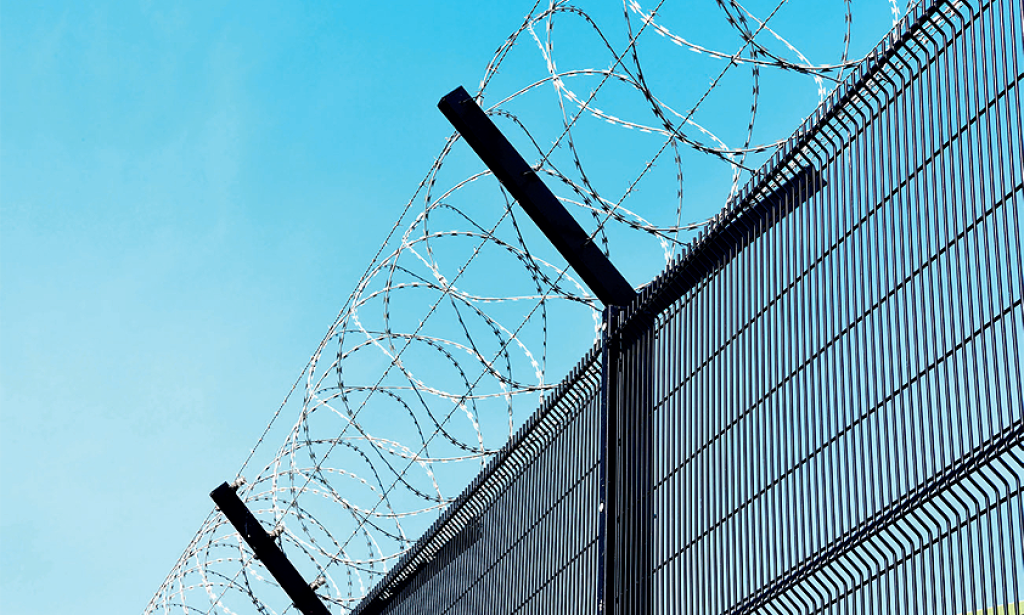A secure fence is one of the best ways to protect your home, ensuring safety, privacy, and peace of mind. With various materials and designs available, choosing the right security fence can be overwhelming. The best security fence should be strong, tall, difficult to climb, and visually deterrent to potential intruders.
In this blog, we will explore the best types of fences for home security and help you decide which one suits your needs best.
1. Steel Fences
Best for: Maximum security and durability
Steel fences are one of the strongest options available, providing high-level security with their durability and resistance to break-ins. They are often designed with:
- Vertical bars to prevent climbing.
- Powder-coated finishes for rust resistance.
- Customizable heights, typically 6 feet or more for added protection.
Pros: Extremely durable, weather-resistant, and hard to cut.
Cons: Expensive and may require professional installation.
2. Aluminum Fences
Best for: Aesthetic appeal with moderate security
Aluminum fences are similar in design to steel fences but are lighter and more affordable. They provide a good level of security and are resistant to rust and corrosion. However, they are not as strong as steel.
Pros: Low maintenance, rust-resistant, and stylish.
Cons: Less durable than steel, easier to bend under force.
3. Wrought Iron Fences
Best for: Elegant security fencing
Wrought iron fences combine strength and aesthetics, making them a popular choice for high-end homes. They are heavy-duty and nearly impossible to cut or break. The addition of spiked tops further deters intruders.
Pros: Extremely strong, visually appealing, and long-lasting.
Cons: Expensive and requires regular maintenance to prevent rust.
4. Chain Link Fences (with Security Enhancements)
Best for: Budget-friendly security fencing
Chain link fences alone don’t offer high security, but when reinforced with barbed wire, privacy slats, or anti-climb coatings, they become an effective security solution.
Pros: Affordable, durable, and easy to install.
Cons: Offers little privacy without additional enhancements.
5. Composite Fences
Best for: Durable, low-maintenance security fencing
Composite fencing is made from a mix of wood fibers and plastic, offering the appearance of wood with enhanced durability. It is resistant to rot, termites, and weather damage.
Pros: Strong, long-lasting, and requires minimal upkeep.
Cons: More expensive than traditional wood fences.
6. Brick or Stone Walls
Best for: Ultimate privacy and security
A solid brick or stone wall offers maximum security since it is impossible to climb, cut, or break through easily. Adding metal gates or electric fencing can further enhance security.
Pros: Extremely secure, soundproof, and weather-resistant.
Cons: Expensive and requires professional installation.
7. Wooden Fences (With Security Features)
Best for: Classic look with added privacy
A 6-8 foot wooden fence with smooth, solid panels can provide excellent security, especially if combined with metal reinforcements and anti-climb designs.
Pros: Affordable, offers privacy, and blends well with landscapes.
Cons: Requires regular maintenance and can be vulnerable to termites or weather damage.
FAQs on Home Security Fencing
1. What is the most secure type of fence for a home?
Steel, wrought iron, and brick walls are considered the most secure because they are durable and difficult to climb or break.
2. How high should a security fence be?
For effective security, a fence should be at least 6 feet tall, with 8 feet being ideal to deter intruders.
3. How can I make my existing fence more secure?
- Add anti-climb spikes or barbed wire.
- Install motion sensor lights near the fence.
- Use security cameras to monitor the perimeter.
- Reinforce weak points with metal brackets or locks.
4. Do security fences increase property value?
Yes! A well-built security fence adds value to your property, improves curb appeal, and enhances privacy.
5. What type of fence is best for both security and privacy?
Brick walls, composite fences, and wooden fences with solid panels are great for both security and privacy.
6. Are chain link fences secure?
On their own, they provide limited security, but adding barbed wire, privacy slats, or a locking gate improves their effectiveness.
7. How often do security fences need maintenance?
It depends on the material:
- Metal fences need repainting or rust-proofing every few years.
- Wood fences need staining or sealing annually.
- Brick walls require occasional repairs but are generally low maintenance.
Final Thoughts
Choosing the right home security fence depends on your budget, security needs, and aesthetic preferences. Steel, wrought iron, and brick walls offer the highest security, while wood and composite fences provide a balance of privacy and protection.
Regardless of the type, enhancing your fence with security cameras, motion lights, and anti-climb features can further strengthen your home’s defense.
Ready to install a high-security fence for your home? Explore your options and choose the one that best fits your needs!



You must be logged in to post a comment.